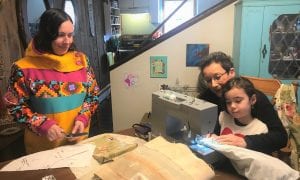WESTFIELD – David Racicot wears a blue suit to work but there is a young Afghan-American woman who might think of him as a knight in shining armor – if that icon was a part of her cultural heritage.
Racicot was the police officer dispatched to a Franklin Avenue address a week ago after a 911 emergency dispatcher received a call from a woman who, before the call was disconnected, whispered that she needed to leave but was not allowed to.
Racicot, a burly veteran officer with an imposing mien, reports that when he arrived at the door of the residence he was greeted by a man who was evasive but allowed him entry.
Racicot found six persons, including a young woman who looked to be scared, gathered together in the living room and reports that when he asked the group if anybody had called police nobody answered.
He said that when he asked the scared young woman directly if she had called police the woman nodded affirmatively.
When he asked her if she wanted to speak with him privately she again nodded and led him upstairs to her bedroom where she asked him to close the door.
There, the 19-year-old girl said that her family had placed her on “lock-down” and explained that she had not been allowed to use a phone or computer, have money, have a boyfriend, go to school, get a job or leave the house for two months.
Racicot said that he believed the girl had been abused by her family but was too scared to tell him about it.
She explained to Racicot that her family was from Afghanistan and in their culture it is normal for the family to control the lives of the children but, after living in America for 11 years, she wanted to make decisions for herself and believes that she has the right to do so.
“She was scared to death,” he said.
Racicot asked the young woman if she wanted to leave with him and she said that she did.
He reports that she had her clothing, jewelry and other possessions packed up out of sight and was ready to go.
“She was looking for an escape route and I gave her that escape route” Racicot said later.
He reports that, when he went into the girl’s bedroom with her, her sister went into an adjoining bedroom and he opined that she was there to report to the family what she could hear of her sister’s conversation with the officer.
He said that when he came downstairs carrying the girl’s possessions, family members objected and said that he couldn’t take her out of the house citing their culture as justification.
Racicot reports he explained that, despite the family’s cultural mores, they are in the United States where an adult woman is free to go where she wishes and the family did not further dispute his passage with the young woman.
Racicot consulted with the police department’s domestic violence advocate, Donna Suckau, and a temporary safe haven for the woman was found.
He reports that family members arrived at the station a short time later saying that he had no right to take the girl from their home and demanding to know where he took her.
He said that he “escorted” one of the girl’s brothers from the station and later escorted other family members out of the station when they persisted and came back to the police station.
Racicot reports that family members also sought the young woman at the Samaritan Inn but did not find her there.
He said that the young woman is in real danger.
“She’s betrayed the family” he said and points out that the family’s culture sanctions “honor killings” to remove the stigma which attaches to a family shamed by the disobedient actions of a daughter.
Racicot downplayed his role saying “I ain’t a hero, I just do my job” but his actions have been noticed.
“That was very good work” Capt. Michael McCabe said.
Suckau said that because of the girl’s cultural conditioning, she is very reticent to complain about her family but has said that she has been abused by them.
She told Suckau that, although her parents have been verbally abusive, her older brothers have been physically abusive in their attempts to control her and Suckau said that it is her brothers who have been most persistent in their efforts to find their errant sister because they want to silence her, “however they want to silence her.”
Suckau said that the girl is “going against their religion” by her actions “so you’re shunned by the whole community.”
“She has brought to light a situation that, in her mind, is wrong but, in her culture, it’s acceptable behavior” Suckau said.
She said that the girl is caught in a cultural clash, having experienced the American culture while still being caught in the culture of her family.
“Behind the closed doors of middle America, you have the underground of people who have come to this country and want to be part of Westfield. But, in their culture, being part of Westfield is not what it’s all about” Suckau said.
Although Suckau said that the girl is reluctant to talk about her family, she said she has learned that the girl was born in the United States when the family was living in Queens, N.Y. She said that the girl went back to Afghanistan with her family before they returned to America and lived in Westfield where the family has been merchants.
Suckau said that the woman is “not telling us everything she needs to tell us” but she has learned some things about the woman’s life in Westfield.
Suckau said that the girl had been going to a private high school in Springfield but her family pulled her out of the school during her senior year after they learned that she had found a boyfriend at the school.
Not only would a romantic attachment complicate their marriage plans for the girl but the family has a particular aversion to the boy in question because he is of Hispanic heritage, Suckau said.
“She hasn’t been able to leave the house in two and a half months” since she was removed from the school, Suckau said.
Suckau said that she was able to find the young woman a place in a battered women’s shelter in a nearby community.
“She has to completely cut herself off from her whole community” Suckau said, “and she’s willing to do that.”
But, Suckau said,“We can’t just put her in a shelter and say ‘We’re done’”.
She said that the girl has at least one big advantage.
Having been born in America, she is a citizen and thus eligible for assistance that might not be available to non-citizens.
“It will work out, (but) it’ll probably be later than sooner” Suckau said confidently.
It’s a happy ending, she said, “or at least the start of a new life for her.”







